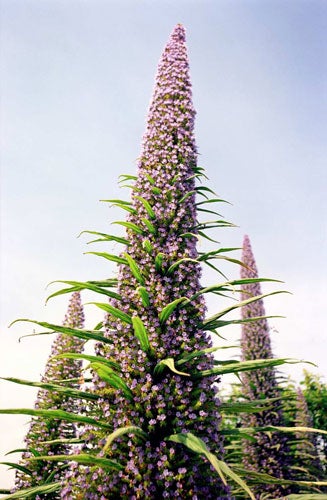Urban gardener: An echium in the UK

I don't make a habit of singing punk rock anthems in my garden, but a line from the Sex Pistols' "Anarchy in the UK" came to me the other day while trying to find a spot for a tree, echium (Echium pininana). What's so anarchic about that? I hear you say. Well, in the face of climate change, nothing really, it's just that it's been sitting in a pot in our backyard since June and really needs to go in the ground if it's to do its spectacular thing next year. It was the frustration of not knowing where to put this frost-tender biennial that brought on the rendition (I had to change the words slightly to fit the occasion), "I know what I want / But don't know where to plant it!" which then became my working mantra for the rest of the day.
Echium are becoming increasingly popular in the UK thanks to our mild winters. I was going to use mine purely for its foliage in the Bupa Garden at Chelsea earlier this year but it wasn't large enough to make an impression. Now, graced with an elegant rosette of lanceolate leaves, I want it. I've always wanted to grow echium in my own garden. The spires, festooned with blue flowers that rocket to between three and four metres, are about as dramatic as anything you'll see in a garden, especially on a clear day when bees swarm to the inflorescent matrix of tiny, funnel-shaped flowers proving that non-natives do have a role to play in the bio-diversity of our backyards.
The sheer number of slugs in our garden may have defeated it earlier in the year but now armed with bristles on its lower leaves it should be safe. But our garden doesn't really get the best of the sun until late morning so after a day of dithering and whingeing I finally accepted that it should go to Meadbank Care Home in Battersea, south London, where the Bupa Garden is currently being re-located. It's the kinder option. One end of its courtyard basks in sunshine for much of the day, just what this Canary Island native needs, and the surrounding walls will also help keep frost at bay. Sustained temperatures below -3 to -4C will eventually kill the tree echium, so it's still worth choosing a good position to give it the best opportunity to reach its full potential. The plant will also perish from saturated roots, so good drainage is imperative if it's to cope with our wet weather. A south- or west-facing wall should give it all the protection it needs, but a covering of bracken might be necessary in more exposed locations. Even if it does survive winter, echium can get a grump on if conditions aren't quite right come early summer and might need another season to get over it.
The plant's foliage is handsome enough on its own in the first year but the rocket, once it gets going, is out of this world and can even reach four metres where conditions are right. Like all rockets though, the energy expended in creating such a dazzling spectacle leaves nothing in reserve and the plant eventually dies. Before its demise, be sure to give it a good spanking to release its seeds. If your soil has been reasonably enriched with home-made compost, echium seeds will germinate where they fall (don't cover them with soil as they need light to germinate) within a few weeks, but will then take another 18 months at least to produce the flower spike. If you've grown it from seed collected this summer they'll need transplanting into pots and over-wintering in a cool greenhouse to keep them from the frost. Bought seed can be sown under glass in early spring. At a push you could grow it in a large pot but this, despite their drought tolerance in the wild, will mean diligent watering to achieve anything like the stature you'd expect in open ground and more frost protection to boot. Being vertical they take up much less room than you'd imagine in a small garden (allow a metre between plants if you're planning a colony) but make sure they get enough light, otherwise they'll elbow their way through anything to get what they want. There, you see – anarchy in their veins after all.
Subscribe to Independent Premium to bookmark this article
Want to bookmark your favourite articles and stories to read or reference later? Start your Independent Premium subscription today.

Join our commenting forum
Join thought-provoking conversations, follow other Independent readers and see their replies